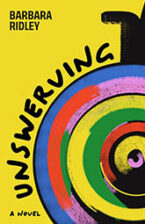Unswerving by Barbara Ridley. Madison, Wisconsin: The University of Wisconsin Press, 2024. 227 pages. $19.95. Paperback.
Barbara Ridley’s novel Unswerving is a journey through perseverance and the importance of community. Tave, a delightfully judgmental character, is introduced as a bitter young woman who recently broke her neck in a car accident, losing her ability to walk, function in her arms and hands, and, perhaps more importantly, contact with her girlfriend Les, who was also in the crash. Tave begins the novel as a grumpy protagonist struggling to come to terms with her circumstances. As she slowly regains control of her hands and arms, but not her legs, Tave needs to push herself to recover both physically and mentally. Enter Beth, her 30-something year-old primary physical therapist, who serves as a counterpoint to Tave. Having a more optimistic outlook, Beth is the kind of person to enjoy the reward and teamwork of working in rehabilitation. As a fellow lesbian, Beth identifies with Tave’s mental turmoil and isolation and goes beyond the call of duty for her.
From there, Ridley tells a brilliant story of what it means to live with a disability. The novel is open about the hardships being paralyzed can bring, yet never dramatizes what it means to be disabled. Instead, the story crafts a cast of disabled characters who are independent, joyful, and find fulfilling hobbies within the disabled community, such as handcycling. With these side characters who invite Tave, and the readers, into their world, Ridley shows the importance of a dependable community to survive. This community is pivotal to Tave’s mental recovery and well-being, helping her find new sports, having previously been a softball player, and independence. This means day-to-day independence in the form of mobility and independence from her homophobic, extremist-Christian family. By spending time with colorful characters Maddy, who Beth introduced to Tave, and Billie, a former patient in Tave’s unit, Tave is made to question her own preconceived notions about being disabled. As she becomes more comfortable around Maddy and Billie, Tave also becomes more comfortable with herself.
This storyline is mirrored by the significance of both Tave and Beth being gay. Beth acutely sympathizes with Tave’s lack of support system and refusal to rely on her unaccepting mother. Because of this, Beth feels a greater personal responsibility to helping Tave discover how she would live meaningfully with her paralysis, which leads her to introduce Tave to other people who are disabled, help her go on outings away from the hospital, and help her find more information about Les and the crash. The bond between the two is in part fostered by this sense of queer solidarity. Through this connection and Tave’s slow but welcomed entrance into the disabled community, Ridley underscores the importance of having a community to rely on. To Ridley, independence and community are inseparable, both in queer and disabled communities, despite how a starkly individualist culture would define the terms.
–Haley Souders, Mid-American Review

